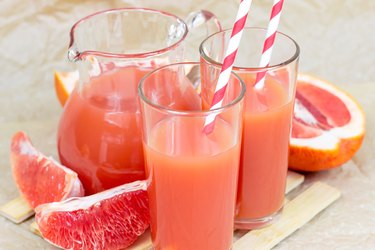
If you take cholesterol-lowering medications like statins, you may know there are some foods you should stay away from — most famously, grapefruit juice. But does that mean you should avoid all citrus fruits, including lemons? Here's what you need to know about statins and citrus fruits to stay safe.
The Citrus Connection
Video of the Day
Drinking grapefruit juice or eating the whole fruit can cause a dangerous interaction with some statin drugs, including atorvastatin (Lipitor) and simvastatin (Zocor), as the juice blocks an enzyme that helps your body break down and use the medication, according to the U.S. Food & Drug Administration (FDA). That means more of the drug enters your bloodstream, and it stays around longer. Too much of the drug in your body can increase your risk for side effects like liver and muscle damage.
Video of the Day
That's why you should absolutely avoid grapefruit juice when taking a statin. However, the same is not true of other citrus fruits.
"It's the specific compounds within grapefruit that impact the drug — not citrus fruits in general," says Erin Palinski-Wade, RD, a New Jersey-based nutrition and diabetes expert. "You don't have to worry about eating lemons, oranges or other citrus when on cholesterol-lowering drugs."
It's an important distinction, too, as citrus fruits are good for your heart, and their benefits extend beyond cholesterol control. For one, citrus is packed with potassium, which helps regulate blood pressure.
When it comes to lemon specifically, a small April 2014 study in the Journal of Nutrition and Metabolism linked daily intake of lemons to lower systolic blood pressure. That's the amount of pressure in your arteries when your heart is beating. It's the first number in a blood pressure reading, and an elevated reading increases your risk for heart disease, according to the American Heart Association.
Lemons contain a compound called citric acid, and the researchers suggested it may promote absorption of other minerals involved in improving blood pressure, like calcium and magnesium.
What's more, citrus can be a stellar source of fiber, according to Palinski-Wade. That's great for anyone, but especially for those who are on lipid-lowering medications. Soluble fiber binds with blood lipids to usher cholesterol out of the body. "Increasing fiber in general can help reduce your need for statins or lower the likelihood that you'll have to increase your dose in the future to keep your cholesterol in a healthy range," she says.
Food to Avoid on Statins
If you're taking statins, it's important to take steps to maintain a heart-healthy lifestyle. "In general, if you're on medication to lower your lipids, the main purpose is to decrease the risk for cardiac health events in the future," Palinski-Wade says.
That means following a diet in which 10 percent (or less) of your daily calories come from saturated fat. To accomplish that, you'll probably want to reduce your intake of animal-based fats (like those from beef, pork, butter and cream) and get more plant-based unsaturated fats like avocado or olive oil, she says.
Finally, there have been warnings that pomegranate juice may also interact with statins. However, a small August 2016 study in the European Journal of Drug Metabolism and Pharmacokinetics looked at the effect of taking pomegranate juice with simvastatin. That study found pomegranate juice did not inhibit the same enzyme that grapefruit juice does.
That being said, when starting a new lipid- or blood-pressure-lowering drug, you should always talk to your doctor about potential interactions, as well as any necessary dietary adjustments you need to make to stay heart smart.
- U.S. Food & Drug Administration: “Grapefruit Juice and Some Drugs Don’t Mix”
- Erin Palinski-Wade, RD, CDCES, LDN, CPT, registered dietitian, New Jersey
- Journal of Nutrition and Metabolism: “Effect on Blood Pressure of Daily Lemon Ingestion and Walking”
- American Heart Association. “Understanding Blood Pressure Readings”
- European Journal of Drug Metabolism and Pharmacokinetics: “Pomegranate Juice Does Not Affect the Disposition of Simvastatin in Healthy Subjects”
Is this an emergency? If you are experiencing serious medical symptoms, please see the National Library of Medicine’s list of signs you need emergency medical attention or call 911.